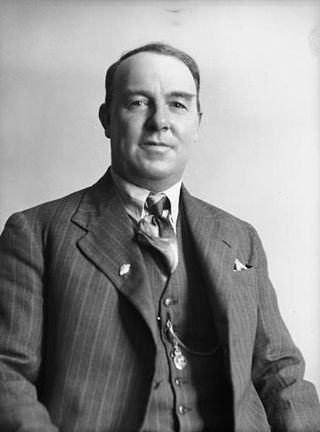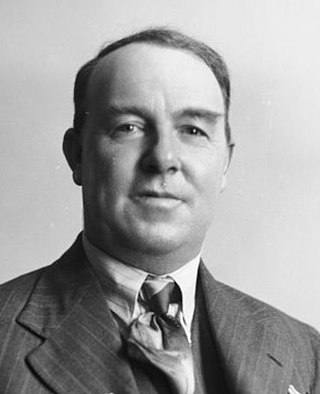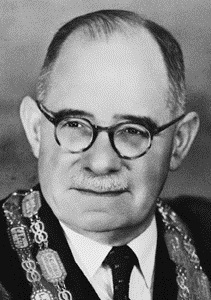
The Mayor of Christchurch is the head of the municipal government of Christchurch, New Zealand, and presides over the Christchurch City Council. The mayor is directly elected using a First Past the Post electoral system. The current mayor, Phil Mauger, was elected in the 2022 mayoral election. The current deputy mayor is Pauline Cotter.

Sir Robert Mafeking Macfarlane was a New Zealand politician of the Labour Party. He was a Member of Parliament, served as Speaker of the House of Representatives and was a Mayor of Christchurch.
Christchurch South was a parliamentary electorate in the city of Christchurch, New Zealand from 1881 to 1890 and then from 1905 to 1946.

Melville Edwin Lyons, sometimes called Tiny, was briefly a Reform Party Member of Parliament in New Zealand until his election was declared void. A journalist by trade, he became involved in local politics in Christchurch after having served in WWI. He was Deputy Mayor of Christchurch for six years under mayor Ernest Andrews.

The 1939 Christchurch South by-election held on 3 June was caused by the death of Ted Howard during the term of the 26th New Zealand Parliament. The by-election in the Christchurch South electorate was contested by Robert Macfarlane for Labour and Melville Lyons for National, with Macfarlane winning the election. At the time, Macfarlane was Mayor of Christchurch.

The 1943 Christchurch East by-election held on 6 February was caused by the death of Tim Armstrong during the term of the 26th New Zealand Parliament. The by-election in the Christchurch East electorate was contested by five candidates, including representatives from the Labour Party, the Labour breakaway party Democratic Labour Party and the National Party. The election was won by the Labour candidate, Mabel Howard, and started her long parliamentary career, which included her becoming the first female cabinet minister in 1947.
The mayor of Timaru is the directly elected head of the Timaru District Council, the local government authority for the Timaru District in New Zealand, which it controls as a territorial authority.

The Christchurch mayoral by-election in 1936 was triggered by the resignation of the incumbent, Dan Sullivan, who had been appointed cabinet minister after the Labour Party winning the general election in November 1935. The election was won by John Beanland of the Citizens' Association, who narrowly beat the Labour candidate.

The 1950 Auckland City mayoral election was part of the New Zealand local elections held that same year. In 1950, elections were held for the Mayor of Auckland plus other local government positions including twenty-one city councillors. The polling was conducted using the standard first-past-the-post electoral method.

The 1953 Christchurch mayoral election was part of the New Zealand local elections held that same year. In 1953, election were held for the Mayor of Christchurch plus other local government positions. The polling was conducted using the standard first-past-the-post electoral method.

The 1956 Christchurch mayoral election was part of the New Zealand local elections held that same year. In 1956, election were held for the Mayor of Christchurch plus other local government positions. The polling was conducted using the standard first-past-the-post electoral method.
The 1958 Christchurch mayoral election was held to elect a successor to Robert Macfarlane who resigned as Mayor of Christchurch upon his selection as Speaker of the New Zealand House of Representatives. The polling was conducted using the standard first-past-the-post electoral method.
The 1959 Christchurch mayoral election was part of the New Zealand local elections held that same year. In 1959, election were held for the Mayor of Christchurch plus other local government positions. The polling was conducted using the standard first-past-the-post electoral method.
The 1962 Christchurch mayoral election was part of the New Zealand local elections held that same year. In 1962, election were held for the Mayor of Christchurch plus other local government positions. The polling was conducted using the standard first-past-the-post electoral method.

The 1971 Christchurch mayoral election was part of the New Zealand local elections held that same year. In 1971, elections were held for the Mayor of Christchurch plus other local government positions. The polling was conducted using the standard first-past-the-post electoral method. The incumbent, Ron Guthrey of the Citizens' ticket, was defeated by the Labour Party candidate Neville Pickering.

The 1974 Christchurch mayoral election was part of the New Zealand local elections held that same year. In 1974, election were held for the Mayor of Christchurch plus other local government positions. The polling was conducted using the standard first-past-the-post electoral method. A significant change was the introduction of a ward system, with city councillors elected in five wards.

The 1938 Christchurch City mayoral election was held on 11 May. The incumbent, John Beanland of the Citizens' Association, failed to get the nomination by his party and the surgeon Dr. John Guthrie was nominated instead. The Labour Party nominated Robert Macfarlane. Both the Labour and conservative candidate had been members of Christchurch City Council for some years. Macfarlane narrowly won the mayoralty.

The 1941 Christchurch City mayoral election was held on 17 May. The incumbent, Robert Macfarlane of the Labour Party, did not stand for re-election as he wanted to serve in WWII. Four candidates stood and Ernest Andrews of the conservative Citizens' Association was successful. Andrews was installed on 28 May 1941.

The 1944 Christchurch City mayoral election was held on 27 May. The incumbent was Ernest Andrews of the conservative Citizens' Association. Andrews was challenged by his predecessor, Robert Macfarlane, of the Labour Party, who had returned from active war service. Andrews won by a large majority.

William Smith MacGibbon was a New Zealand businessman and politician.












